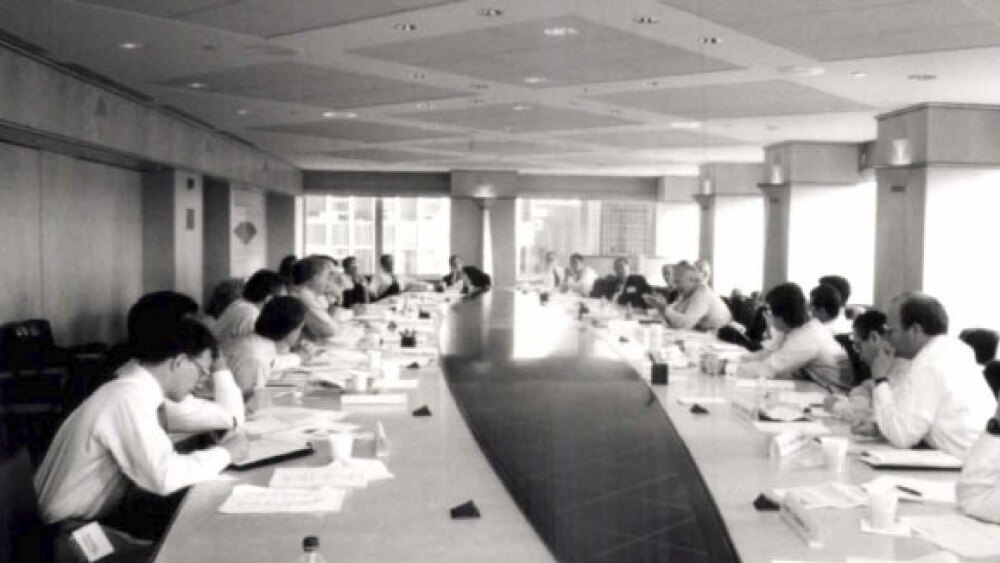High interest rates have frozen the capital markets for commercial real estate. As buyers and sellers argue over the real value of real estate, the volume of deals has shrunk to a fraction of its level before rates began to rise.
For 30 years—in good years and bad—the conversations at the ULI/McCoy Symposium on Real Estate Finance have helped industry leaders understand trends in their business. And the history of these conversations provides some valuable clues to how this latest disruption in the capital markets might eventually resolve.
“Cycles are nasty things. We set out to solve one set of problems, but before we are halfway through, the next set of problems appears,” says Bowen H. “Buzz” McCoy, formerly responsible for the real estate financing unit at Morgan Stanley and now president of Buzz McCoy Associates Inc. in Los Angeles.
McCoy organized the first symposium three decades ago. The invitation-only event is designed to create “a conversation with real estate industry leaders where they would be as open and candid as they could,” says Lynn C. Thurber, chair of JLL Income Property Trust and former ULI global chair.
Confidentiality
Participants are free to use any information they receive from the symposium, but they agree not to reveal the identity or affiliation of any other participant. These “Chatham House Rules” help keep these conversations as open as possible. Over the years, Urban Land has been able to share select details of the conversations that happen inside the room at the symposium.
“It’s a very safe zone to talk about what’s going on within your business,” says Mark Wilsmann, former managing director and head of equity investments for MetLife Investment Management’s Real Estate group, and a frequent participant in the McCoy Symposium. “You get this very … blunt, candid conversation.”
The candid conversations help participants understand each other’s perspectives. “The best way to smooth out business problems is to work hard at developing long-term relationships of trust,” says McCoy.
Participants were already planning conversations before the symposium in December 2023 to help answer questions or confirm theories about the coming year.
For one very specific example: many opportunity-minded investors hope to buy over-leveraged properties in 2024 at a discount as owners are forced to sell. Others believe that if such properties as apartment assets have income, and borrowers are willing and able to maintain their buildings, banks may allow them to “extend and pretend,” says Sheridan “Schecky” Schechner, managing director and U.S. head of real estate investment banking at Barclays Capital, based in New York.
Conversations at the symposium may give Schechner a chance to test that theory. “In the room, I’ll definitely have a couple of conversations about … their appetite to take back loans in multifamily,” says Schechner.
Featured presentations
In recent years, the symposium has featured presentations on the state of capital markets and the outlook for the coming year by Roy March, chief executive at real estate investment bank Eastdil Secured; and Ken Rosen, chairman of real estate market research firm Rosen Consulting Group, chairman of the Fisher Center for Real Estate and Urban Economics, and professor emeritus and California state chair of real estate and urban economics at the Haas School of Business at the University of California, Berkeley.
Rosen has a long history of skepticism around what he calls artificially low interest rates. “The initial response to the Great Financial Crisis, pouring money into the system in 2008, 2009, and 2010, and during the coronavirus in 2020 and 2021, was right—but then they kept going,” says Rosen. “That led to this huge overvaluation.”
March, working from the same set of data, has a more optimistic view. “If we look at what a normalized cost of capital is, Ken and I will agree on that,” March says. However, even as real estate values adjust to “normalized” interest rates, closer to their levels before the Great Financial Crisis, he believes commercial real estate will continue to attract investment because of its underlying characteristics: resiliency in terms of inflation and current income.
“Every time there’s been any downturn as a result of interest rate rises, there’s been an upturn that outsizes where the levels were before,” says March. He tends to point “up and to the right,” sketching an upward slope in his future forecast.
“You always get the two perspectives, one right after another,” says Schechner. “It’s very interesting to hear that.”
The idea for the McCoy Symposium began with a meeting in 1991, in the aftermath of the savings and loan crisis. The original attendees included McCoy and Rosen, along with other capital markets leaders, such as economist Anthony Downs. They met at the U.S. Federal Reserve with then-chairman Alan Greenspan and other Fed board members and staff. The group of real estate experts gathered again thereafter for the first official McCoy Symposium and has met every year since then.
“If there’s any period that looks similar to that time, it is this one,” says Rosen. “There was no money, and there were a lot of delinquencies and foreclosures.”
The capital markets disruption was eventually resolved with a government intervention to resolve vast portfolios of troubled loans. Other disruptions were resolved as new sources of capital emerged.
Early days
March often shares with the other attendees at the symposium a story from the beginning of his career in the capital markets. In March 1980, he stood in a payphone in Boulder, Colorado, with a roll of dimes, calling the head of a major insurance company about joint venture financing to redevelop a hotel on the beach in Waikiki.
But the Federal Reserve had just hiked its benchmark interest rate up to 20 percent. The funder did not approve March’s financing. “Here I was, 20-odd months in, feeling like my fledgling career in real estate finance was over,” March recalls. “But we pivoted.” Soon afterward, March found equity partners from Japan to redevelop the hotel. As he says, year after year, to symposium participants, “It’s now one of the most valuable pieces of real estate in the world.”
The story has had broad applicability over the years. It’s especially useful today, as high interest rates are once again causing chaos for real estate transactions.
“Bottom line is: the world has never ended as relates to commercial real estate,” says March.






